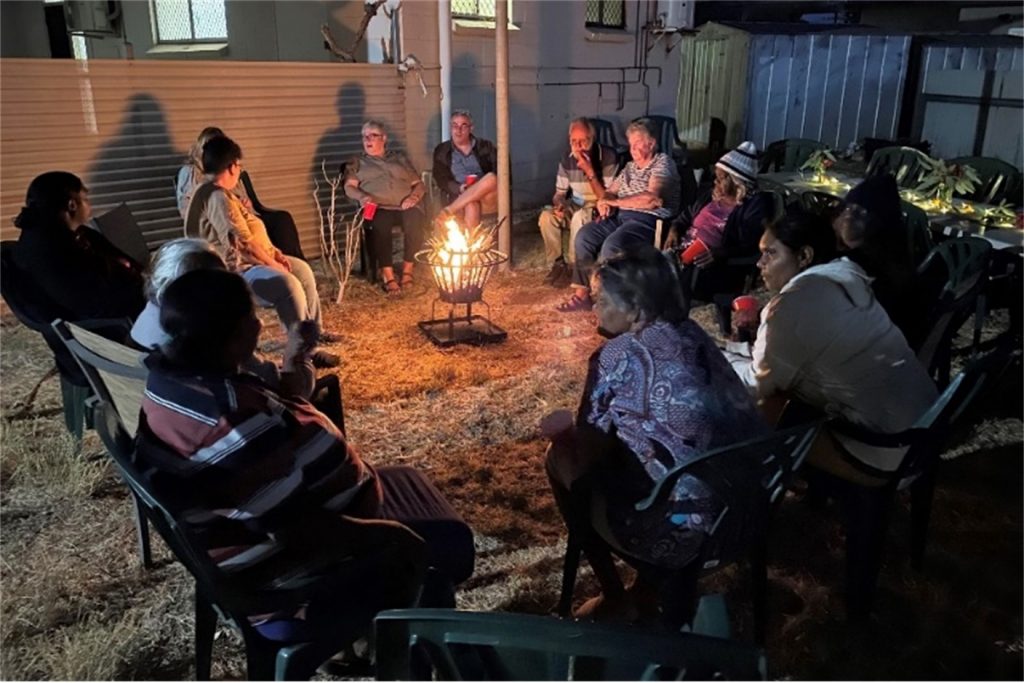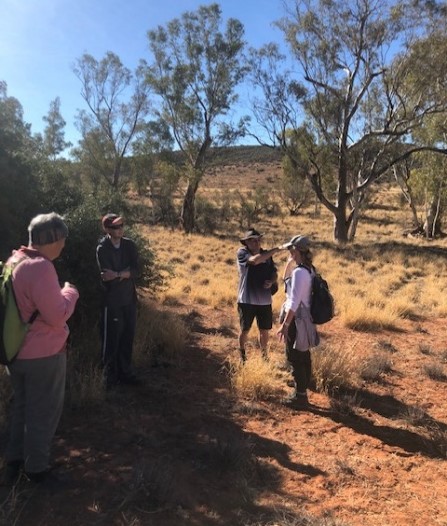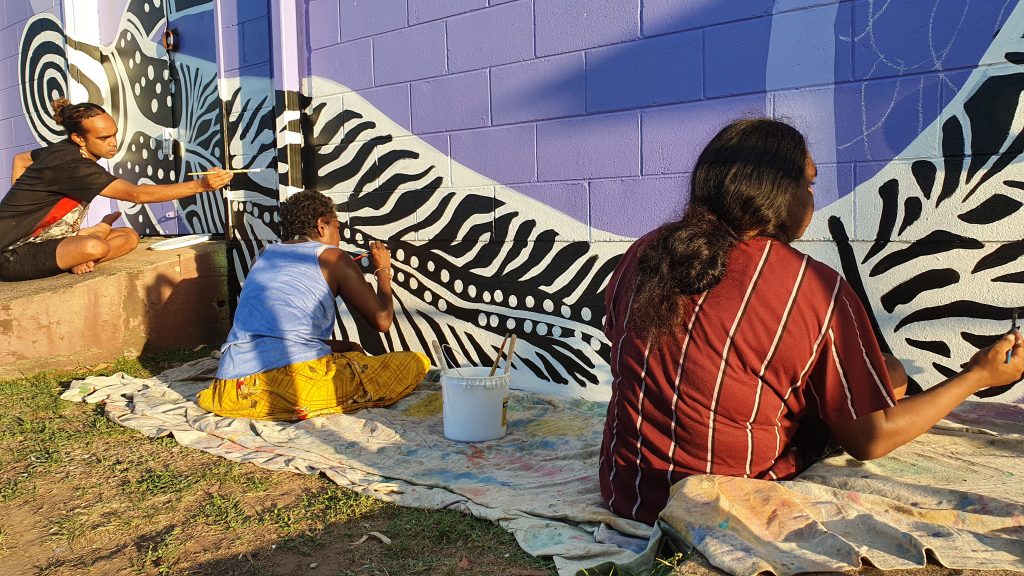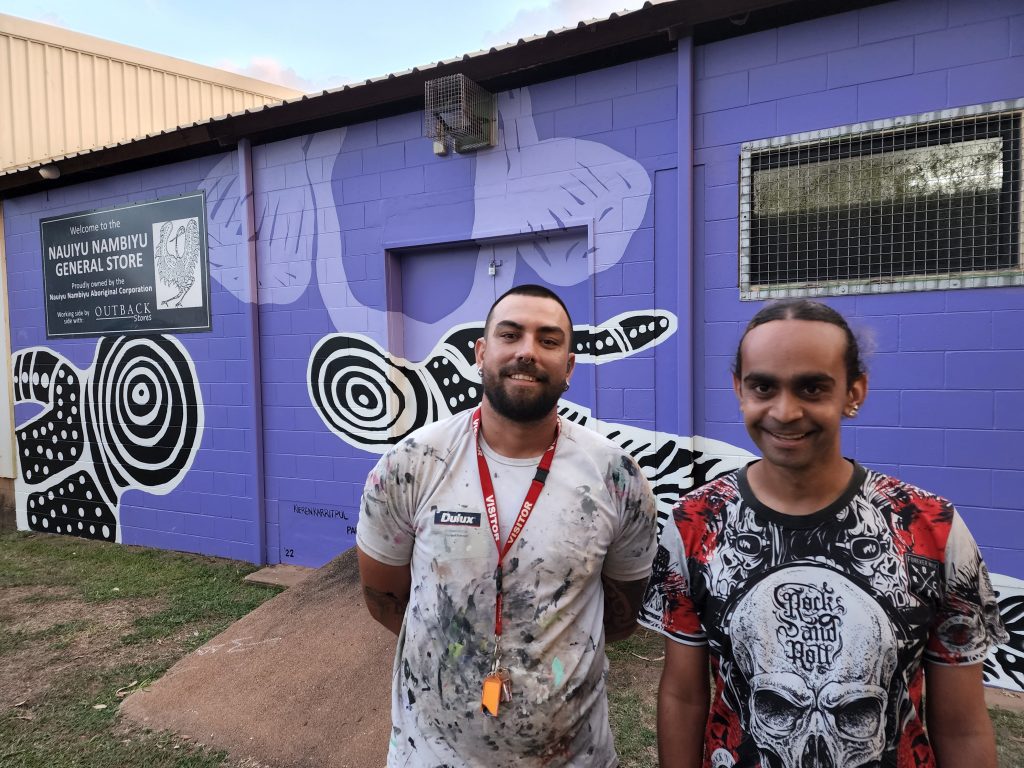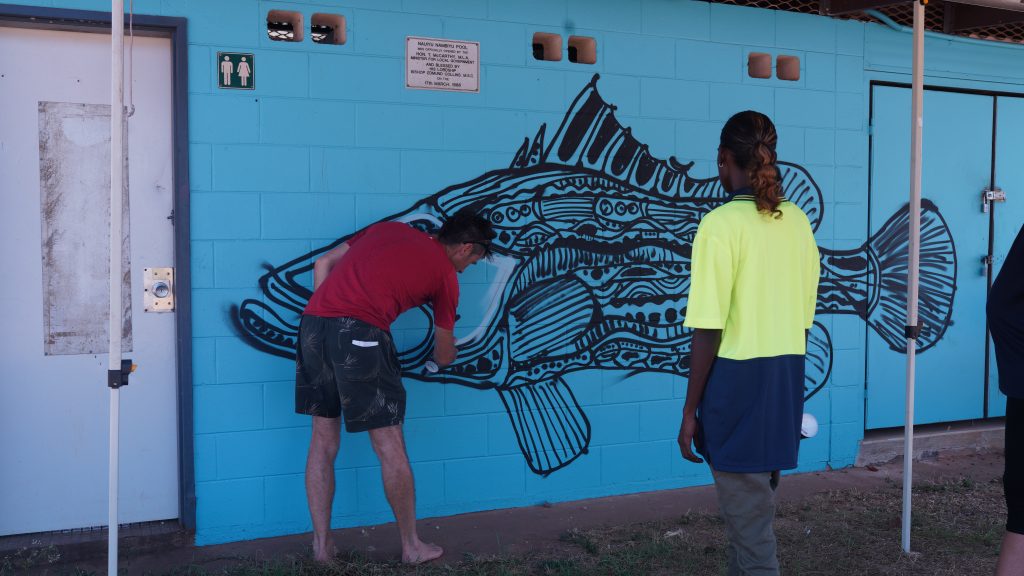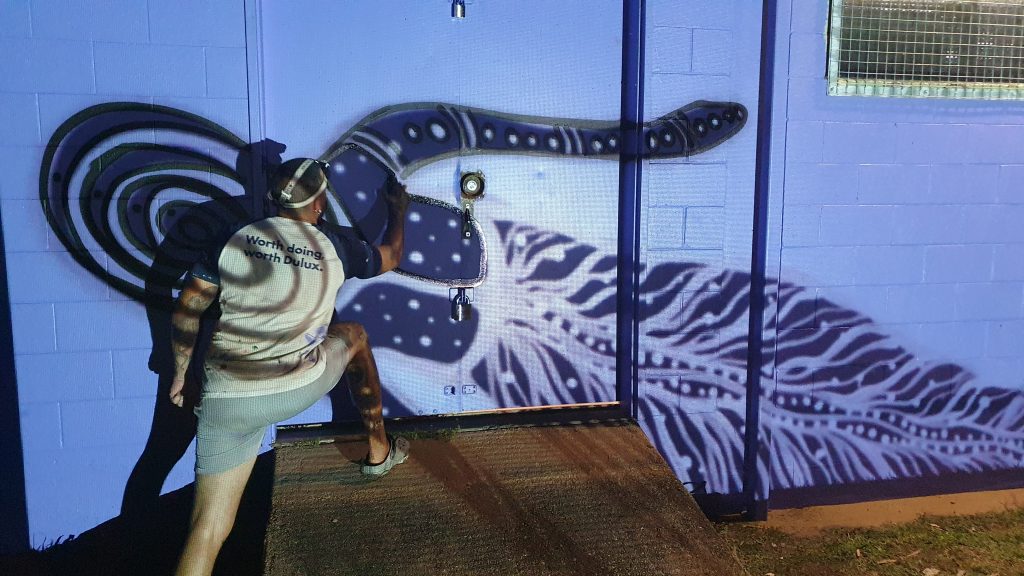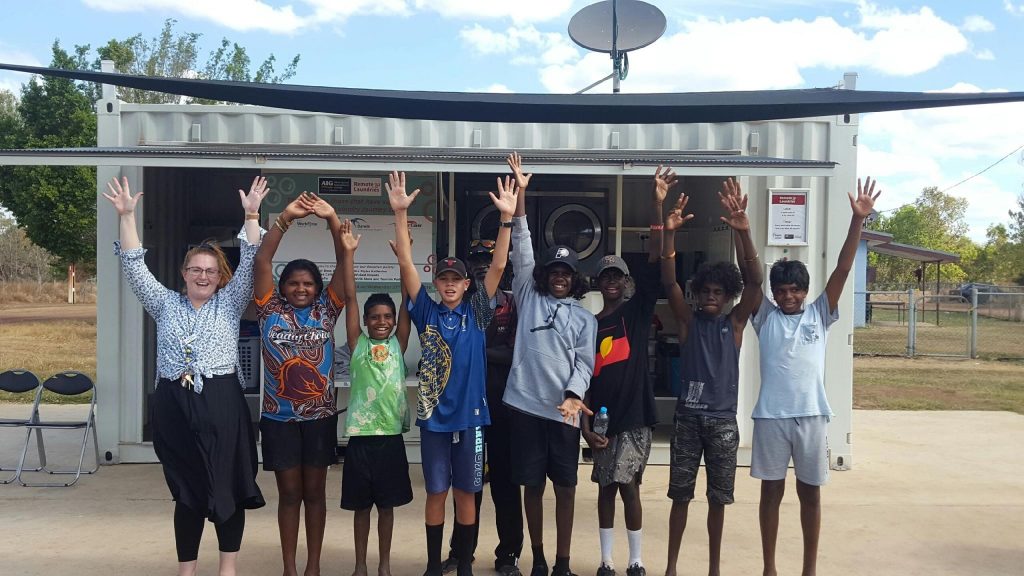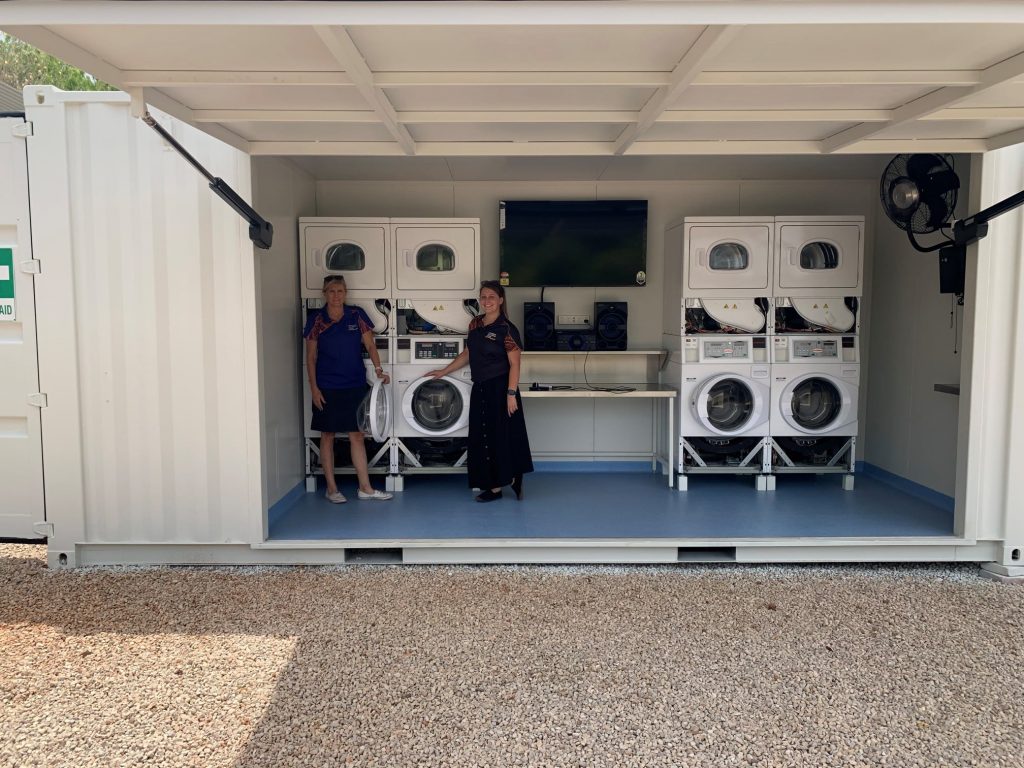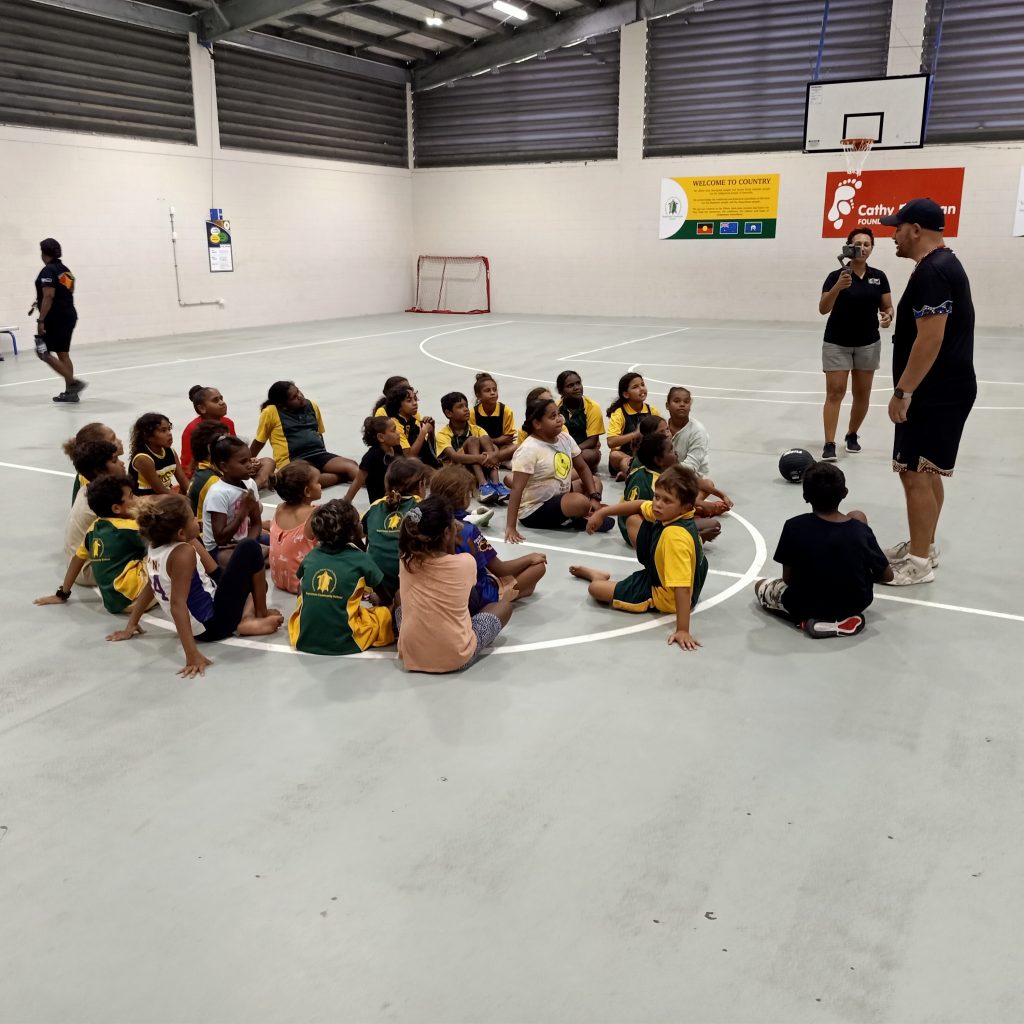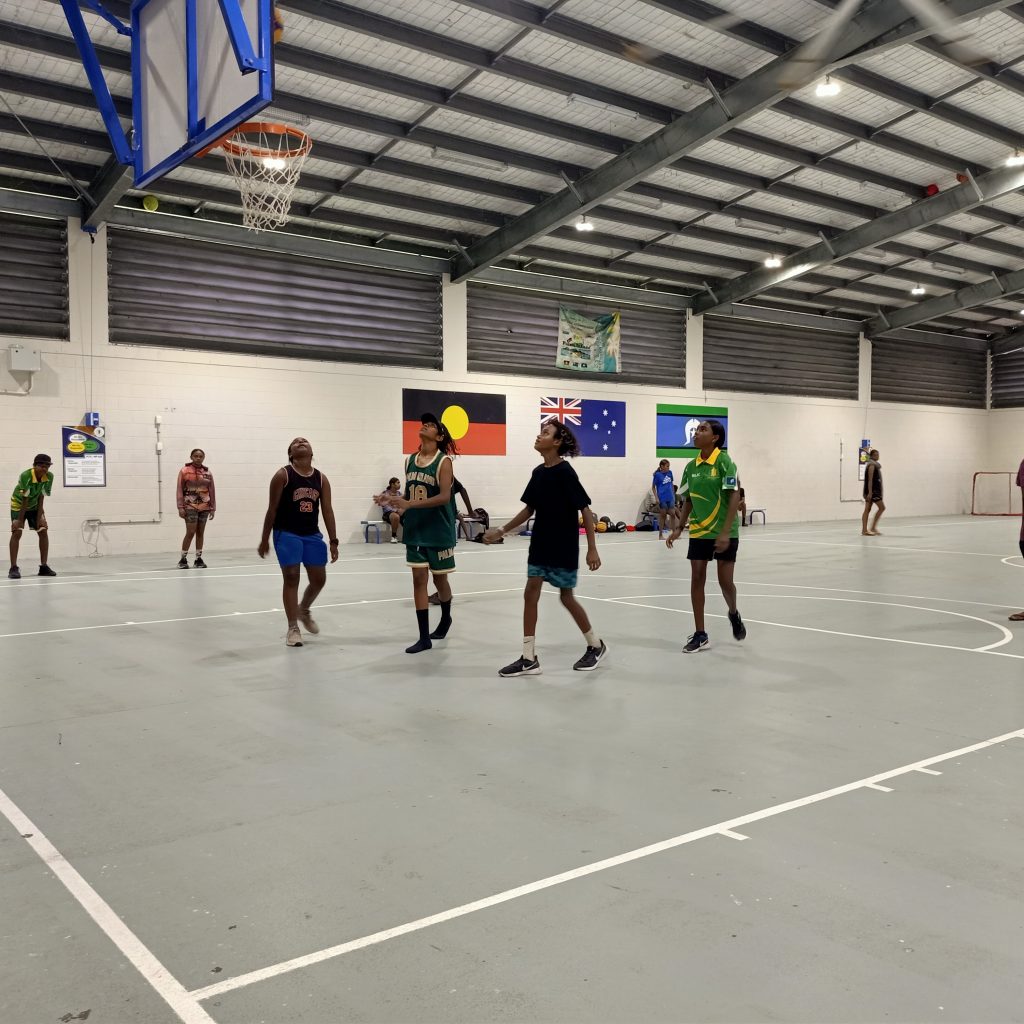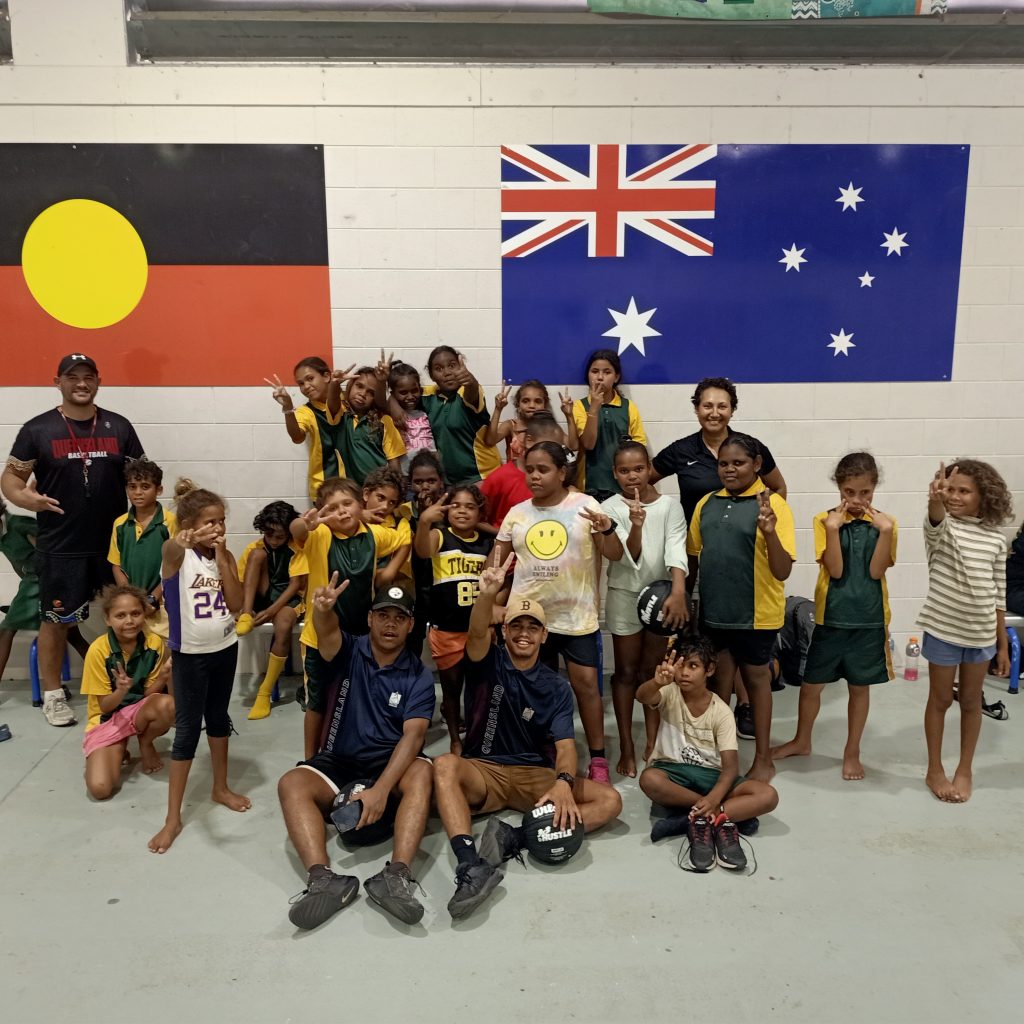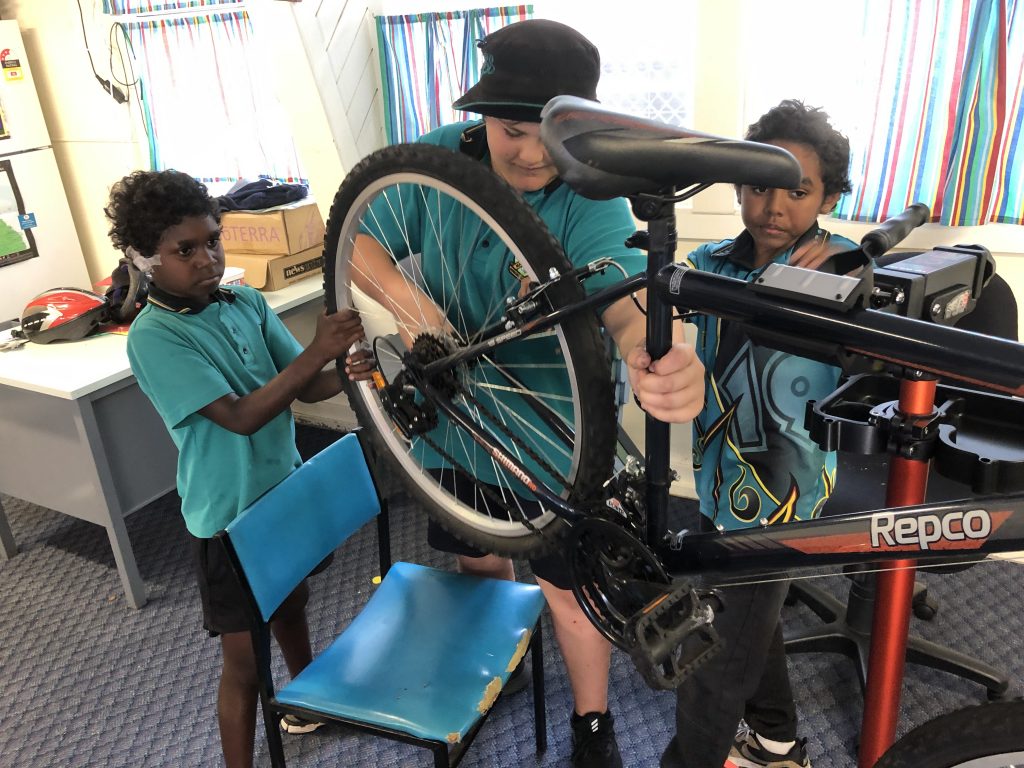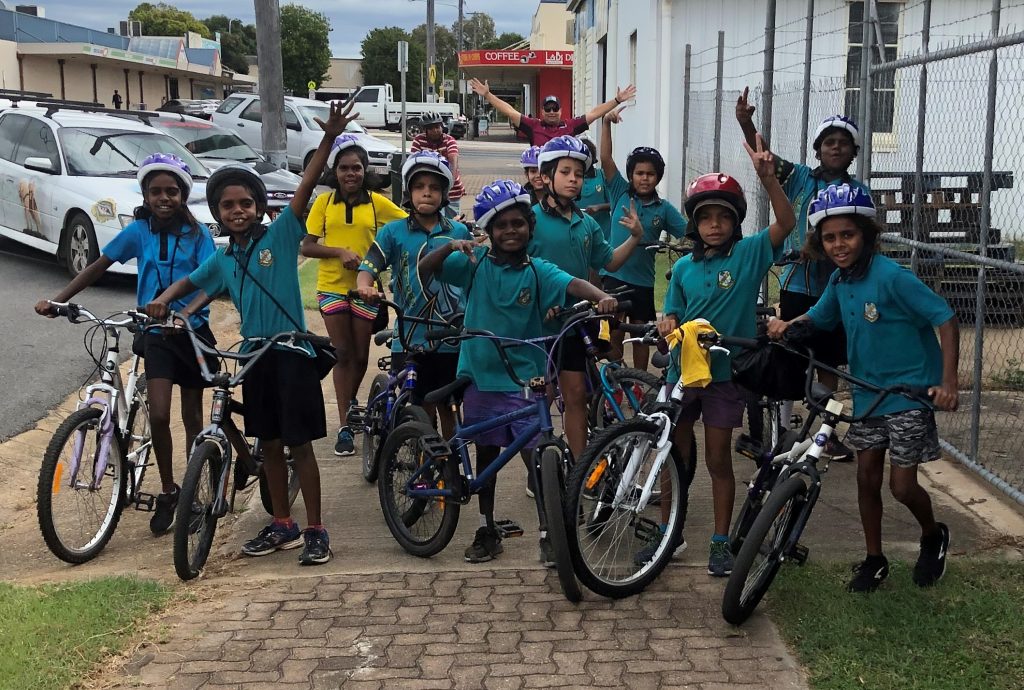Foundation for Rural & Regional Renewal (FRRR)
Eastern Arrernte Country
Ltyentye Apurte Catholic School (LACS) is one of the most successful remote Aboriginal schools in central Australia and the NT. It is the only school serving the 600-strong community of Ltyentye Apurte (pronounced ‘L-Ginga Porter’, which means ‘clump of beefwood trees’ in the Arrernte language) or Santa Teresa. A number of the facilities at LACS are communal, notably the library and computers. The community is 83 km south east of Alice Springs in semi-desert country. Temperatures are extreme, ranging from -1 to 45 degrees but there is year-round access via an unsealed road.
The local Arrernte people are bilingual and speak Eastern Arrernte and English (which is often their second or third language). The Arrernte language and cultural program is a key part of the curriculum at LACS.
In Santa Teresa, extreme socio-economic disadvantage is the norm, with residents and the school facing many challenges, notably extremely poor housing and health, high unemployment with minimal employment opportunities, adults suffering from poor mental health and a high number of students suffering from intergenerational trauma. Remote schools in general have a major issue with teacher retention due to the complex challenges of students and their families. The average stay of a teacher in NT schools is 7 months and 9 months in catholic schools. Existing senior staff frequently work 80 hour weeks regularly wearing multiple hats in part due to a lack of teachers.
According to the Principal at the time, to a great extent, the future of Santa Teresa depends on the school providing the optimum best education for Santa Teresa youth – “To make the remote community of Santa Teresa strong, we must make its school strong.”
There are currently 126 students on roll, from Pre-School to Year 11. They are all Indigenous and bilingual. Most of the teachers at LACS are non-Indigenous and come with a range of experience from mainstream education. The school is also a major employer of the local Arrernte people, with approximately 60% of Indigenous staff filling a multitude of critical support roles. Teachers work as members of a team in partnership with local Indigenous people and Arrernte assistant teachers and tutors.
Isolation and the challenges of living and working in a community context mean that staff need all the support they can get, in terms of building resilience. Ongoing change is the norm, with the last two years (2020/21) seeing significant change and uncertainty. There is often a significant turnover of new staff, which presents additional challenges to building trust and resilient community.
The impacts of these factors are significant, including very high levels of stress, distraction from the mission of educating students, lower engagement, uncertainty about the future, change fatigue, staff burnout, talent loss and lower trust in leaders.
To try to address this, the then Principal knew they needed to help teachers and staff build resilience, sustainable high performance and change agility. They used a $10,000 grant from FRRR, through the Strengthening Rural Communities program, funded by the Tim Fairfax Family Foundation, to run the Resilience Educators Program (REP).
The REP began with all teachers completing a Resilience Diagnostic, prior to a two-day workshop. The Diagnostic measured individual resilience in areas such as emotional regulation, self-confidence, compassion, exercise, sleep and nutrition. Staff then participated in a two-day workshop, facilitated by Paul Salmon, called “Thriving Through Change and Challenge”. Each staff member created three goals to help improve their resilience and the option of having an accountability buddy or sessions with a resilience coach to support them in reaching their goals.
After the workshop, the teachers were given access to an app, which provided a detailed resilience report and materials to develop new skills. They also committed to participating in a range of activities as groups of staff and the whole staff community, such as an evening walking group, weekend trips away and a regular BBQ breakfast. This was followed up with a visit from the Resilience coach, which led to three shared goals being created.
Despite challenges in rolling this out due to the pandemic and its subsequent impacts, staff collaborated to implement wellbeing activities based on their learnings from the workshops and the ongoing use of the Resilience App. They continue to come together as a community to support one another in challenging times.
The outcome has been an improvement on the health and wellbeing of the whole community.
“All staff became more aware of the importance of resilience and the necessity to plan for how to manage stress and cope with the added burden of the pandemic. There is also a greater understanding by leadership of the necessity to prioritise staff wellbeing through strategic planning using an integrated holistic approach.
“It has become part of our school culture for staff to check in with each other on how they are travelling, especially concerning sleep, exercise and levels of stress. It is now becoming part of our meetings to start with a partner check in or short meditation activity. We introduced a new wellbeing curriculum program, MindUp for Life, which not only teaches the knowledge and skills children need to regulate their stress and emotion but also supports teachers in building positive relationships with students and the broader community.
“There is a more holistic focus on wellbeing and resilience with an area created in the staffroom where staff relax and do mindful colouring. Plus, there are opportunities for staff to publicly acknowledge and show gratitude for effort, and pampering products for staff in our rest rooms,” said Pamela Brown, Acting Principal.
For more inspiring stories like this, head to our FY 2021/22 Annual Review.
Access to reliable, high quality mobile phone coverage is important for everyday activities. But it is critical when it comes to the lifesaving activities that the Freycinet Volunteer Marine Rescue Association undertake on a regular basis.
Based in Swansea on Tasmania’s east coast, the Association’s base is located on low lying Council land, which impacts the mobile phone signal from the local Telstra tower as it requires a direct line of sight for best coverage. The building is steel framed and clad, further blocking the already weak mobile signal. This meant members had to go outside of the building to obtain a mobile signal, which at best was two bars. Going outside to check the Bureau of Meteorology website prior to launching a rescue vessel involved waiting several minutes to access a signal and the important weather data.
COVID exacerbated the need for a mobile booster to provide stronger and more reliable mobile coverage as member training, which the Australia Maritime Safety Authority requires to be to the same standard as commercial mariners, had to move to Zoom sessions. Zoom provided additional benefits by allowing members the opportunity to remain connected and still have timely input into the Association’s activities.
Another challenge was that family members could not contact volunteers if they were inside the building. If there was an incident or accident while working within the building, there was also no way to make an emergency call without going outside – potentially leaving an injured member unattended.
A $2,244 grant from FRRR’s Strengthening Rural Communities program, funded by a private donor, supported the installation of the mobile booster. The project, described by the Association as ”one of our best projects in over 20 years of operation”, resolved all the issues of being able to access reliable, high quality mobile coverage in the Association’s building.
Results after installation showed 100% signal strength inside the building, providing a safety net for volunteers working on site and enhancing community safety, as information on emergency situations can now be accessed without delay.
For more inspiring stories like this, head to our FY 2021/22 Annual Review.
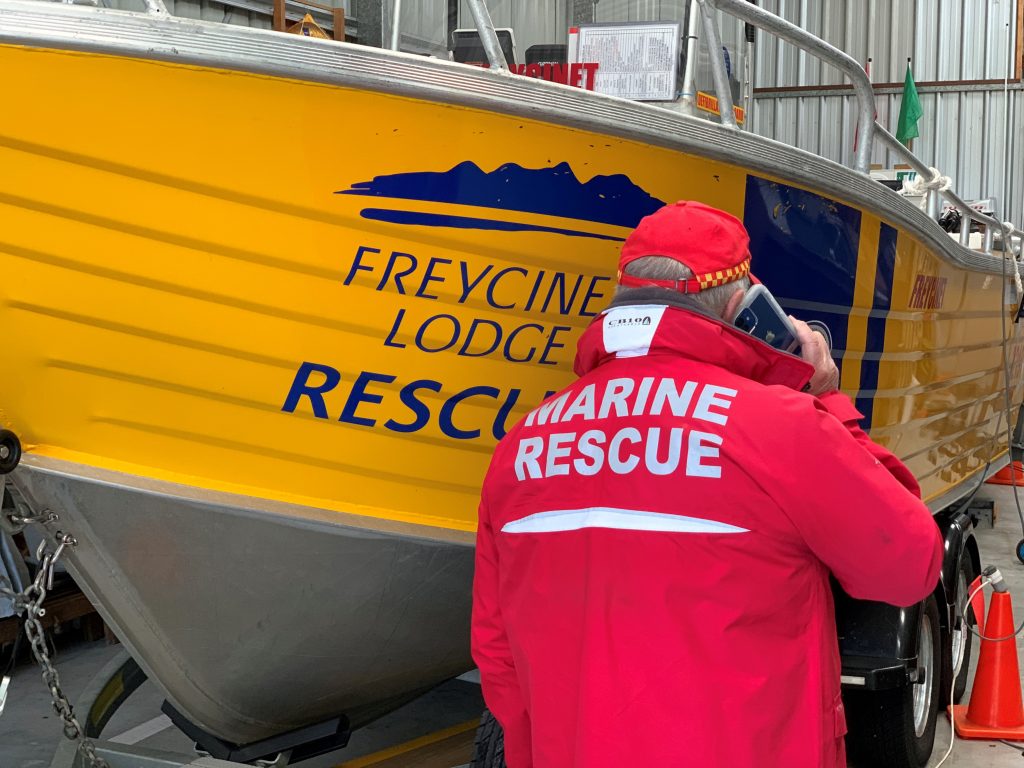
Malak Malak People
Nauiyu is an Aboriginal community of 444 people in the Daly River region in the Northern Territory. Their place, around 2.5 hours drive from Darwin, is said to be one of the best Barramundi fishing spots in the country, and locals hold a strong connection to their land and culture. Despite the idyllic description, Nauiyu experiences alcohol and other drug misuse within its small population. Yet there is strong community support for real solutions that respond to community needs, are culturally appropriate and involve building local capacity and furthering local leadership.
Enter Red Dust. Founded by John Van Groningen, the organisation was born out of his work with youth in the Aboriginal community of Lajamanu in 1984. Today, it delivers innovative health promotion and community development programs that are co-designed through trusted relationships with remote First Nations communities. For the people of Nauiyu, a community-based diversion program celebrating cultural identity and pride would provide a means to connect and engage the vulnerable community.
Consulting the community, Red Dust’s Local Drug Action team coordinated the Red Dust Community Art Collaboration project with local organisations. Green River Aboriginal Corporation identified sites for the murals; Merrepen Arts provided the connection to local artists and culturally relevant iconography; and Ironbark provided access to volunteers and project participants. Proper Creative, based in Darwin, was commissioned to paint the murals in conjunction with local project participants.
With collaboration between local artists, community members, young people, and service providers, and a $5,000 Strengthening Rural Communities grant funded by the Tim Fairfax Family Foundation & Pinnacle Charitable Foundation, Red Dust will deliver three large murals. The project will not only create beautiful public spaces and bring the dreaming of the Nauiyu community to life, it will also support the health, wellbeing and future opportunities for local youth.
The images below feature the impressive first mural, featuring Daly River artist Kieren Karritpul. https://www.reddust.org.au/blog-posts/ldat-2022-05-nauiyu
Yarralin Country
Can you imagine not being able to access a washing machine regularly? Sadly, that’s the reality for many people living in remote First Nation’s communities. Seven out of ten Aboriginal children living in these remote communities will contract scabies before their first birthday. Community homes are overcrowded, 59% do not have washing machines and only 38% of people living in communities wash their clothing and bed linen. This is largely because of a lack of access to power and a regular supply of detergent.
In addition to the health benefits, ready access to clean clothes removes barriers to job and school attendance, encourages community social inclusion and provides an enhanced sense of self pride and purpose.
The North Australian Aboriginal Charitable Trust (NAACT) is the charitable arm of Aboriginal Investment Group (AIG), a registered charity and a genuine not-for-profit entity. NAACT is dedicated to the improvement and regeneration of remote Aboriginal communities and the creation of sustainable employment opportunities for Aboriginal people.
NAACT’s goal is to provide every Aboriginal person the opportunity to have clean clothes and a disease-free home.
That’s where the Remote Laundries Project comes in. It delivers fully automated, custom-built, commercial standard, fit-for-purpose laundries in remote Northern Territory Aboriginal community locations. The washing and drying cycles are provided at no cost, with detergent and chemical grade sanitiser automatically injected into the wash-cycle. Each laundry program site generates five sustainable meaningful positions, is 100% locally staffed and operates 38 hours per week across six days. The laundries allow every sector of the community to access clothes and bedding washing facilities, which increases quality of life by breaking community cycles of disease and sickness common in remote Aboriginal communities. This delivers clear tangible health, social and economic benefits.
It’s an innovative business model – a social enterprise – driven by Aboriginal people. Robust community consultation gives voice to those who will benefit from the project including Traditional Owners. AIG works in conjunction with the relevant on-site Aboriginal Corporation and is directed by this collaboration with Traditional Owners for all significant decisions about development and delivery.
While the majority of this project, valued at $742,000, comes from the Aboriginals Benefit Account, NAACT originally approached FRRR for a grant of $10,000 to go toward the cost of the machines. However, COVID delayed the whole project, including the release of other funding. The project managers and community representatives were keen to ensure that the machines were ready to go when restrictions lifted and other funding was released. The grant was funded, thanks to the support of the Tim Fairfax Family Foundation, through the Strengthening Rural Communities program. NAACT applied for a variation of the original grant agreement, which allowed them to use the grant as a deposit to purchase the washing machine in advance of the Yarralin Remote Laundries Project’s commencement.
In their grant acquittal, Brittany Ciupka, Project Officer, said that FRRR was exceptional, quick to respond and flexible.
“We greatly appreciate FRRR allowing us to secure the machines while we finalised ABA negotiations. This will save large amounts of lead time as the machines ship from the USA. We are excited to forge ahead as soon as ABA gives us the green light and we will keep FRRR in the loop with project updates.”
While the laundry in Yarralin is not yet operational, there are four similar laundries already operating successfully in other remote communities, so FRRR looks forward to continuing to monitor the impact of this this innovative project. It should not only reduce disease but create jobs and income, leading Indigenous people to self-reliance. This in turn will lead to a more engaged, participating community and a stronger sense of place.
For more inspiring stories like this, head to our FY 2021/22 Annual Review.
Palm Island (Bwgcolman) lies north of Townsville, off the east coast of Northern Queensland. The mostly First Nations community experiences chronic social and economic disadvantage, the ongoing impact of historical factors and events, discrimination and lack of support in the justice system and lack of access to (or ineffective) diversionary programs.
The Palm Island Police Citizens Youth Club (PCYC) was established in 2004, and works closely with the Indigenous Programs Development Unit, government agencies, community organisations and members to provide a range of programs that respond to issues faced by the community. The PCYC is well placed to partner with sporting and other local organisations to provide access to sporting and recreational opportunity for young Aboriginal and Torres Strait Islander people, as they are one of the only positive and neutral organisations where people can safely engage in positive and healthy ways.
Following extensive interactions and consultations within the community, PCYC Palm Island, in partnership with Indigenous Basketball Australia (IBA), delivered a 3×3 Street Hustle basketball tournament within the Palm Island community. The aim was to support physical and mental health, encourage community connection, achievement, pride and wellbeing in one of the most vulnerable communities of Australia. The tournament provided a platform for people of all ages, particularly young people, to participate in an organised and nationally endorsed tournament. It also contributed towards closing the gap for people on the remote Palm Island. Participants received online player profiles and rankings, providing them with the foundation to move on to additional tournaments.
In addition, PCYC Palm Island partnered with IBA to deliver school-based basketball development clinics with the two schools on Palm Island. This allowed young people to experience invaluable mentoring interactions with Joel Khalu (Basketball Queensland, IBA, and NBL Mackay Meteors coach) and Australian Olympian Annie Le Fleur (FIBA, WNBL, WNBA, Australian Women’s Team and Olympian). In total 441 students (231 girls, 210 boys) participated in the three coaching clinics, and 96 children and 48 adults competed in the Community 3×3 Basketball Street Hustle competition.
Despite experiencing a series of delays due to COVID and staffing issues, Phil Schulz, CEO of PCYC Palm Island, said that the program provided a foundation from which young people can build as they move on to greater challenges in sport and in life. It also provided community members with much needed social connection opportunities and the ability to participate in an activity that supports physical as well as mental wellbeing. This was all made possible thanks to a $10,000 Small & Vital grant from FRRR’s Strengthening Rural Communities program, funded by the Tim Fairfax Family Foundation.
“It was fantastic to get such quality mentors to deliver our program, and the kids were extremely engaged and excited to be involved to learn new skills. The competitions held were excellent in bringing the community together.
“Having such terrific mentors as Joel Khalu and Annie Le Fleur delivering this program with an extraordinary high level of passion and enthusiasm [was amazing]. They took the time to make sure all the kids got involved to realise levels of potential they possessed. Feedback from both schools was excellent with both requesting this become a yearly interaction.
”Importantly, the program also enhanced Palm Island PCYC’s relationships within the community and its ability to provide support and programming for young people, improve community partnerships and enhance the capacity of young people to participate in and lead future programs.
Take a look at the kids in action and listen to how the Basketball Queensland Indigenous Pathways Program (BQIPP) is making a positive impact on the local community!
Nine projects funded across NSW, QLD and WA
While drought is out of the media spotlight, for many communities it is still a very real and significant issue. FRRR’s Tackling Tough Times Together (TTTT) program has just awarded $86,083 to nine community initiatives in remote, rural and regional communities across Australia still dealing with the impacts of drought.
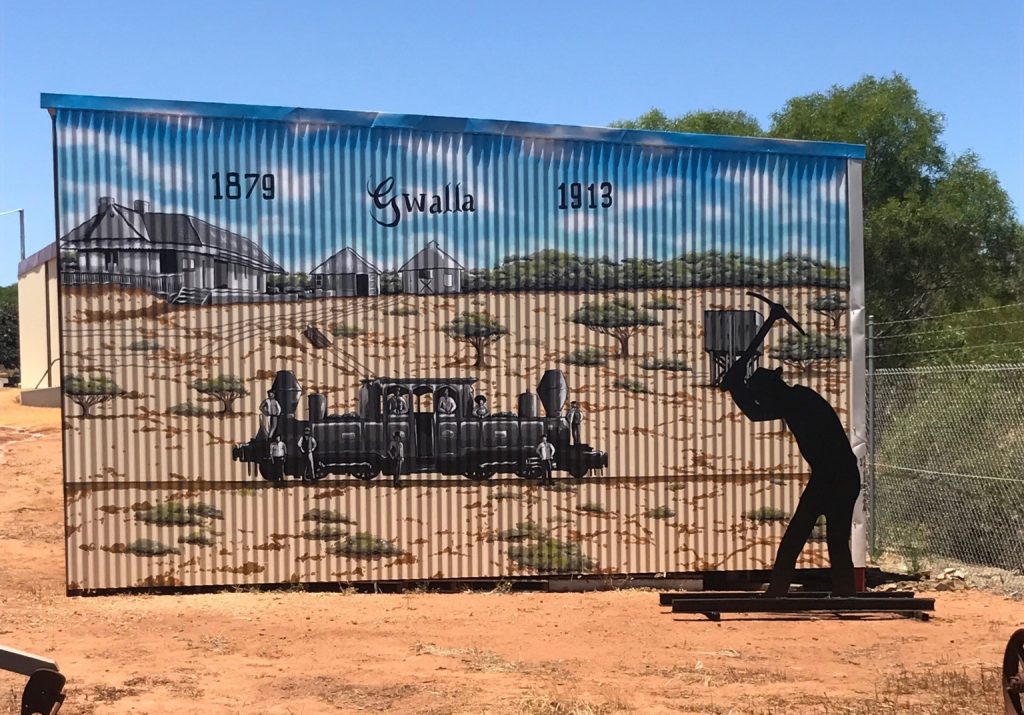
TTTT is a long-running, collaboratively-funded program that helps drought-affected communities to access the funding and resources they need to tackle the long-term impacts of drought. This round of grants will help fund a variety of projects run by local not-for-profit organisations and community groups, including a series of art workshops for both adults and children, a community event featuring Aboriginal artwork, the creation of murals and skills training to support community members experiencing loss and grief.
Nina O’Brien, FRRR’s Disaster Resilience and Recovery Lead, said that there are still many regions across Australia being impacted by drought.
“During this round of grants, the number of eligible LGAs dropped from 152 to 47. While we’re delighted to see such a significant drop in the number of communities being impacted by drought, it’s crucial that we continue to provide support. A lot of places, like remote SA, are still tackling extreme periods of dryness while others are very much still in drought recovery mode. Not to mention the fact that communities are dealing with a variety of other factors as they continue to stand strong and keep their community connected and supported.
“In this round of applications, we saw a lot of projects that are aiming to improve volunteer capacity and build a sense of social connectedness. If the last two years have taught us anything, it’s that our remote, rural and regional communities need volunteers and a strong sense of community in order to thrive.
“When we carried out our Heartbeat of Rural Australia survey last year, the results showed that the effects of drought, as well as the cumulative effects of multiple other disasters, have left volunteers feeling extremely fatigued, and those living in rural communities feeling isolated. That’s why we’re so pleased to be able to fund these kinds of grassroots initiatives at a time when they’re truly needed,” Ms O’Brien said.
Among the other projects funded this round were:
- Red Ridge Ltd – Longreach, QLD – Outback Fashion Festival – Canvas to Catwalk – Provide opportunities for Aboriginal artists from seven outback Queensland communities to participate in fashion print design workshops which culminate in a catwalk runway community event. $10,000
- Rattler Railway Company Ltd – Gympie, QLD – Fatigue Management Accommodation- Build the capacity, capability, and sustainability of Rattler Railway Company Ltd through infrastructure restoration and renovation to support volunteers. $10,000
- For a Better Chapman Valley (FABCV) Incorporated – Chapman Valley & Nabawa, WA – Winter Art Series in Chapman Valley – Facilitate social connection and enhance opportunities for the Chapman Valley community to participate in creative activities through the delivery of art workshops. $7,900
The full list of grant recipients and their projects is listed on the FRRR website.
The TTTT program supports drought-affected regions of Australia by giving community groups and local not-for-profit organisations access to the resources they need to respond to, and recover from, long-term rainfall deficiencies. This program has granted over $18 million to initiatives that are helping communities to tackle the tough times that come with drought.
Funding for this program is generously contributed by the Tim Fairfax Family Foundation, Pratt Foundation, Stockland CARE Foundation, Paul Ramsay Foundation, The Snow Foundation, Henroth Group and private donors from across the nation. To join these donors, and support grants like this through FRRR, you can make a tax-deductible donation at frrr.org.au/giving/.
The full list of grant recipients and their projects are below.
| Organisation | Project | Location | Grant | |||
|---|---|---|---|---|---|---|
| NEW SOUTH WALES | ||||||
| Moama and District Pre-School Centre Inc | Moama & District Preschool Brings Sober in the Country to Moama Improve the community’s social and emotional health and encourage local involvement by hosting a community dinner and guest speaker on drinking culture and supporting healthy choices. | Moama | $9,150 | |||
| QUEENSLAND | ||||||
| Congregation of Central Western Qld UCA | Edgely Hall Improvements Improve volunteer vitality and support social connection by installing air-conditioning in the multi-purpose room of the Longreach Uniting Church. | Longreach | $10,000 | |||
| Red Ridge (Interior Queensland) Limited | Outback Fashion Festival - Canvas to Catwalk Provide opportunities for Aboriginal artists from seven outback Queensland communities to participate in fashion print design workshops which culminate in a catwalk runway community event. | Longreach | $10,000 | |||
| Rattler Railway Company Ltd | Fatigue Management Accommodation Build the capacity, capability, and sustainability of Rattler Railway Company Ltd through infrastructure restoration and renovation to support volunteers. | Gympie | $10,000 | |||
| Kumbia & District Memorial School of Arts Inc | Kumbia & District School Memorial of Arts Inc Hall Improvements Boost and strengthen the local economy and reduce social isolation with town beautification in Kumbia through mural art. | Kumbia | $10,000 | |||
| Connecting Communities Australia Ltd | Let the Show Go On Improve volunteer vitality and support strong social connection by providing a team of volunteers to assist the Longreach Show Committee prepare and coordinate the Longreach Annual Show. | Longreach | $9,933 | |||
| WESTERN AUSTRALIA | ||||||
| The Isolated Childrens' Parents Association of (WA) Inc | 2022 ICPA Federal Conference Build communities’ resilience to continue to face the many ongoing issues and uncertainties that are inherent for families living in rural and remote Australia by hosting a conference where participants connect and learn from one another. | Various | $10,000 | |||
| Busselton Hospice Care Incorporated | Increasing the Capability to Support Grief and Bereavement in our Compassionate Community Empower a community group by providing skills training and capacity building to further support community members experiencing loss and grief. | Busselton | $9,100 | |||
| For a Better Chapman Valley (FABCV) Incorporated | Winter Art Series in Chapman Valley Facilitate social connection and enhance opportunities for the Chapman Valley community to participate in creative activities through the delivery of art workshops. | Nabawa | $7,900 | |||
In many rural communities, non-denominational school chaplains promote strong community connection, participation opportunities and engagement to reduce isolation and encourage better physical and mental health. While these positions are generally funded through local donations, in recent years there simply hasn’t been the money to fund them locally due to drought and, more recently, reduced tourism from COVID-19 restrictions.
Through FRRR’s Tackling Tough Times Together grant program, Scripture Union Queensland received $131,490 to support chaplaincy positions at Ravenswood State School, Charter Towers Central State School and Mareeba State School until June 2022. The grant was made possible through generous donations from the Sidney Myer Fund and the Tim Fairfax Family Foundation.
This funding ensures all programs and activities coordinated by the chaplains, including one-on-one pastoral care conversations and classroom support, are free for all children, young people, families and school staff. These activities help to reduce isolation and increase wellbeing and community participation in communities suffering from the long-term effects of drought.
Since funds were awarded in 2019, the schools have been able to implement change and growth within their chaplaincy programs. At Ravenswood State School, chaplain Anne – a much loved member of the community – was finally able to retire at 83 years old. Her position has been filled by a long term local Charters Towers resident, who works two days a week.
The chaplain at Charter Towers has been able to increase her support to two days a week and is seeing a positive response to the ‘Girls with a Purpose Resilience’ program. Twelve students completed the program in 2019 and there was general consensus among the participants that it was a special time engaging with facilitators and peers. After the COVID-19 school closure in 2020, all girls in grade 6 are now taking part in the program.
A particular highlight for the Mareeba State School has been the implementation of the Bike-Bus program to encourage regular physical activity and increase school attendance and social and community engagement. Since being established in mid-2019, the program has engaged 30 students, as well as parents, grandparents, siblings, teachers and police. It also led to the creation of the Bike Repair Club – an alternative for those who enjoy hands on learning, with all students becoming much more engaged in their education.
The principal of the Mareeba State School, Mandy Whybird, noted the program’s positive impact.
“Our school chaplain provides an invaluable source of support for the students at Mareeba State School. Aside from running friendship groups, supporting children in classes and running lunchtime activities for children who may find the playground challenging, our chaplain also assists in providing breakfasts for children in need and working with children who may have experienced loss or trauma.
“The chaplain also assists to support staff well-being. When our school was shaken by the loss of a teacher last year, our Chaplain was integral to the recovery process for staff,” Ms Whybird said.

